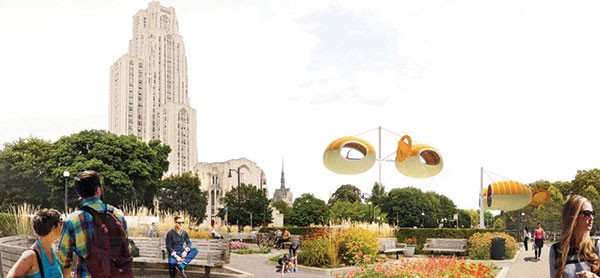Once, it seemed like a promising opportunity for Pittsburgh to get an avantgarde piece of public art that generates clean energy. Instead, a proposal by the Land Art Generator initiative has gotten bogged down in city-government approvals.
LAGI is the brainchild of Lawrencevillebased artist-and-architect couple Elizabeth Monoian and Robert Ferry. (See a profile of the couple.) While they have organized several widely praised international design competitions for such projects — in Dubai, Copenhagen, New York City and elsewhere — they had hoped that their first realized project would be in Pittsburgh. When they proposed a local installation, in 2013, they quickly secured the support of foundations including the Heinz Endowments, the Hillman Foundation and the Horne Family Foundation.

After considering such locations as The Andy Warhol Museum and Carnegie Science Center, their quest brought them to Schenley Plaza, where a 2006 master plan had designated a location along Forbes Avenue as a site for public art. The Pittsburgh Parks Conservancy was a supporter. "The Parks Conservancy is really thrilled to be approached," Conservancy curator Susan Rademacher commented at a public meeting last December.
Instead of holding another competition, "we chose a designer and a design we felt we could work with," says Monoian. Trevor Lee and Clare Olsen, of Philadelphia-based SUPRAFUTURES, had submitted the first version of "Wind Nest" to the 2010 competition. It didn't win, but Monoian and Ferry believed it could be quickly realized in Pittsburgh. "Some of the winning projects [from other competitions] are 10 years of R&D away from construction," says Monoian. SUPRAFUTURE's design uses constructionready wind turbines and thinfilm solar panels. LAGI and SUPRAFUTURES' collaboration with engineers at Buro Happold, who are consultants on the Tower at PNC Plaza, is expediting the project.
"Wind Nest" in its current iteration would be roughly 45 feet tall. It would have four ducted turbines, enclosed by UV resistant TENARA fibers, with photovoltaic film covering one-third of their surface. These lightweight elements would turn like weathervanes, to maximize both solar and wind power. The plan is to power the PNC Carousel.
The LAGI competition was well received in Copenhagen, where EU Commissioner of Climate Action Connie Hedgaard presented awards to the winners. The LAGI competitions have received positive coverage in Fast Company and The New York Times, and Danish Minister of Climate, Energy and Building Martin Lidegaard called them, collectively, "new and exciting proposals for the green transition."
Given such a reception, some in Pittsburgh will be eager to have their home LAGI project be the first completed.
But there are still significant approvals to secure, and skeptics to convince. In December, the proposal got provisional approval from the City of Pittsburgh's Public Art Commission. At its Jan. 28 meeting, the commission reasserted its provisional approval but, paradoxically, asked that the project be scaled down and placed in another location. Board members expressed concern with the proposed size of "Wind Nest" and also with the process, which did not include an open call for Pittsburgh artists.
Monoian and Ferry have expressed tentative willingness to find another site for "Wind Nest," though they wonder whether another location would match both the visibility and the wind performance of Schenley Plaza. A reduction in scale would also mean energy performance "would decline exponentially," says Ferry, "and not meet our stated goals."
LAGI's next competition, in Los Angeles in 2016, is on track, but Ferry and Monoian still want the first LAGI project to be in Pittsburgh. In February, they postponed what was to be yet another presentation before the Art Commission. Says Monoian, "We're hoping to do more community outreach to see if the community really wants this project and what is the right site."














